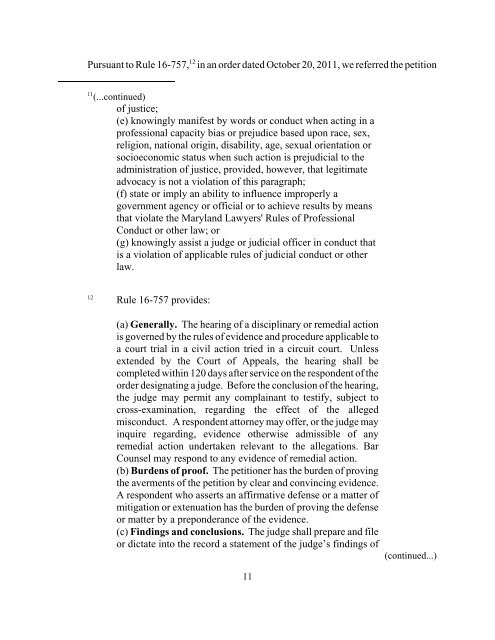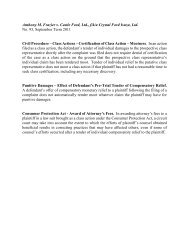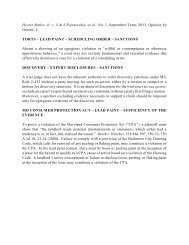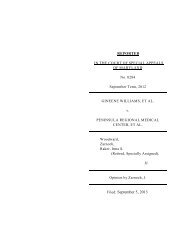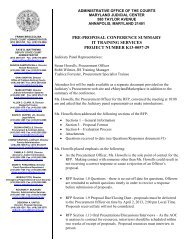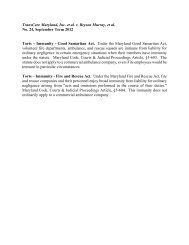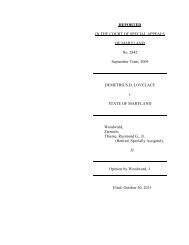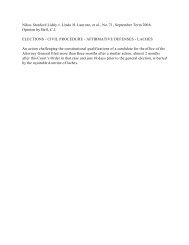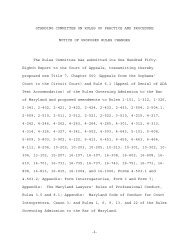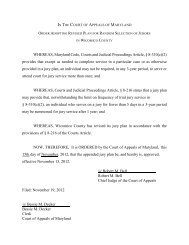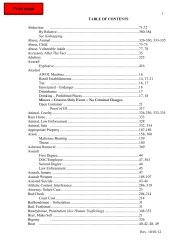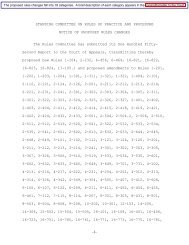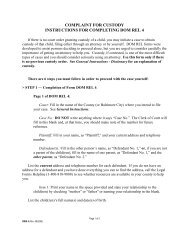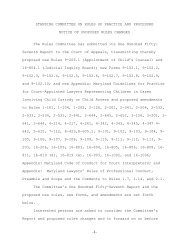44ag/11 - Maryland Courts
44ag/11 - Maryland Courts
44ag/11 - Maryland Courts
Create successful ePaper yourself
Turn your PDF publications into a flip-book with our unique Google optimized e-Paper software.
Pursuant to Rule 16-757, 12 in an order dated October 20, 20<strong>11</strong>, we referred the petition<br />
<strong>11</strong><br />
(...continued)<br />
of justice;<br />
(e) knowingly manifest by words or conduct when acting in a<br />
professional capacity bias or prejudice based upon race, sex,<br />
religion, national origin, disability, age, sexual orientation or<br />
socioeconomic status when such action is prejudicial to the<br />
administration of justice, provided, however, that legitimate<br />
advocacy is not a violation of this paragraph;<br />
(f) state or imply an ability to influence improperly a<br />
government agency or official or to achieve results by means<br />
that violate the <strong>Maryland</strong> Lawyers' Rules of Professional<br />
Conduct or other law; or<br />
(g) knowingly assist a judge or judicial officer in conduct that<br />
is a violation of applicable rules of judicial conduct or other<br />
law.<br />
12<br />
Rule 16-757 provides:<br />
(a) Generally. The hearing of a disciplinary or remedial action<br />
is governed by the rules of evidence and procedure applicable to<br />
a court trial in a civil action tried in a circuit court. Unless<br />
extended by the Court of Appeals, the hearing shall be<br />
completed within 120 days after service on the respondent of the<br />
order designating a judge. Before the conclusion of the hearing,<br />
the judge may permit any complainant to testify, subject to<br />
cross-examination, regarding the effect of the alleged<br />
misconduct. A respondent attorney may offer, or the judge may<br />
inquire regarding, evidence otherwise admissible of any<br />
remedial action undertaken relevant to the allegations. Bar<br />
Counsel may respond to any evidence of remedial action.<br />
(b) Burdens of proof. The petitioner has the burden of proving<br />
the averments of the petition by clear and convincing evidence.<br />
A respondent who asserts an affirmative defense or a matter of<br />
mitigation or extenuation has the burden of proving the defense<br />
or matter by a preponderance of the evidence.<br />
(c) Findings and conclusions. The judge shall prepare and file<br />
or dictate into the record a statement of the judge’s findings of<br />
(continued...)<br />
<strong>11</strong>


